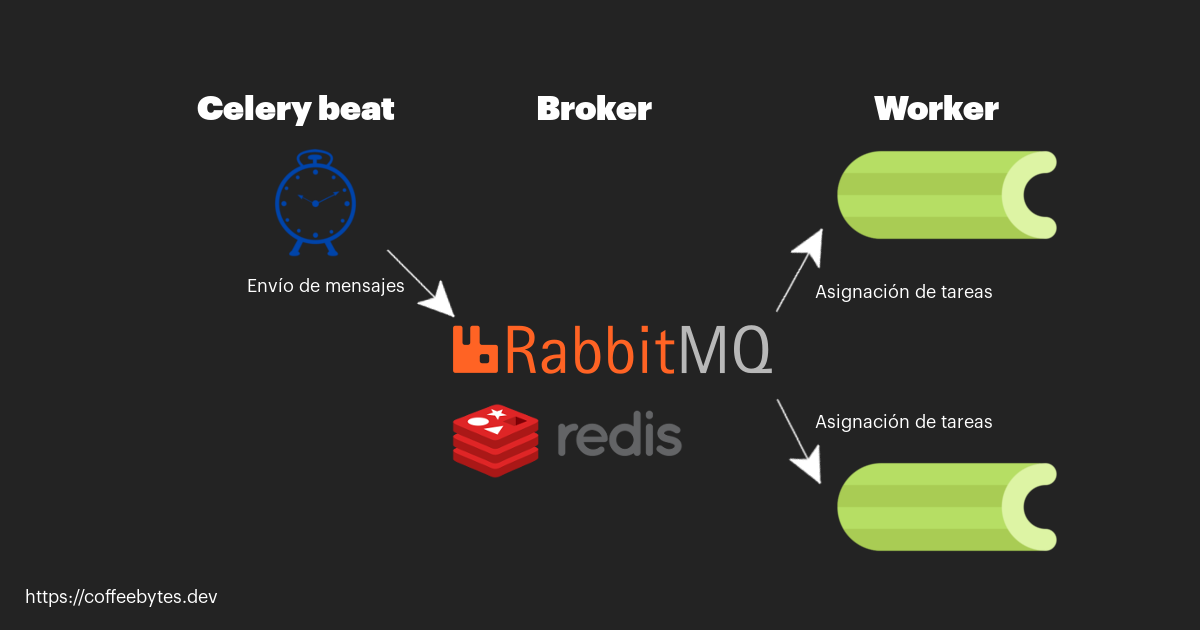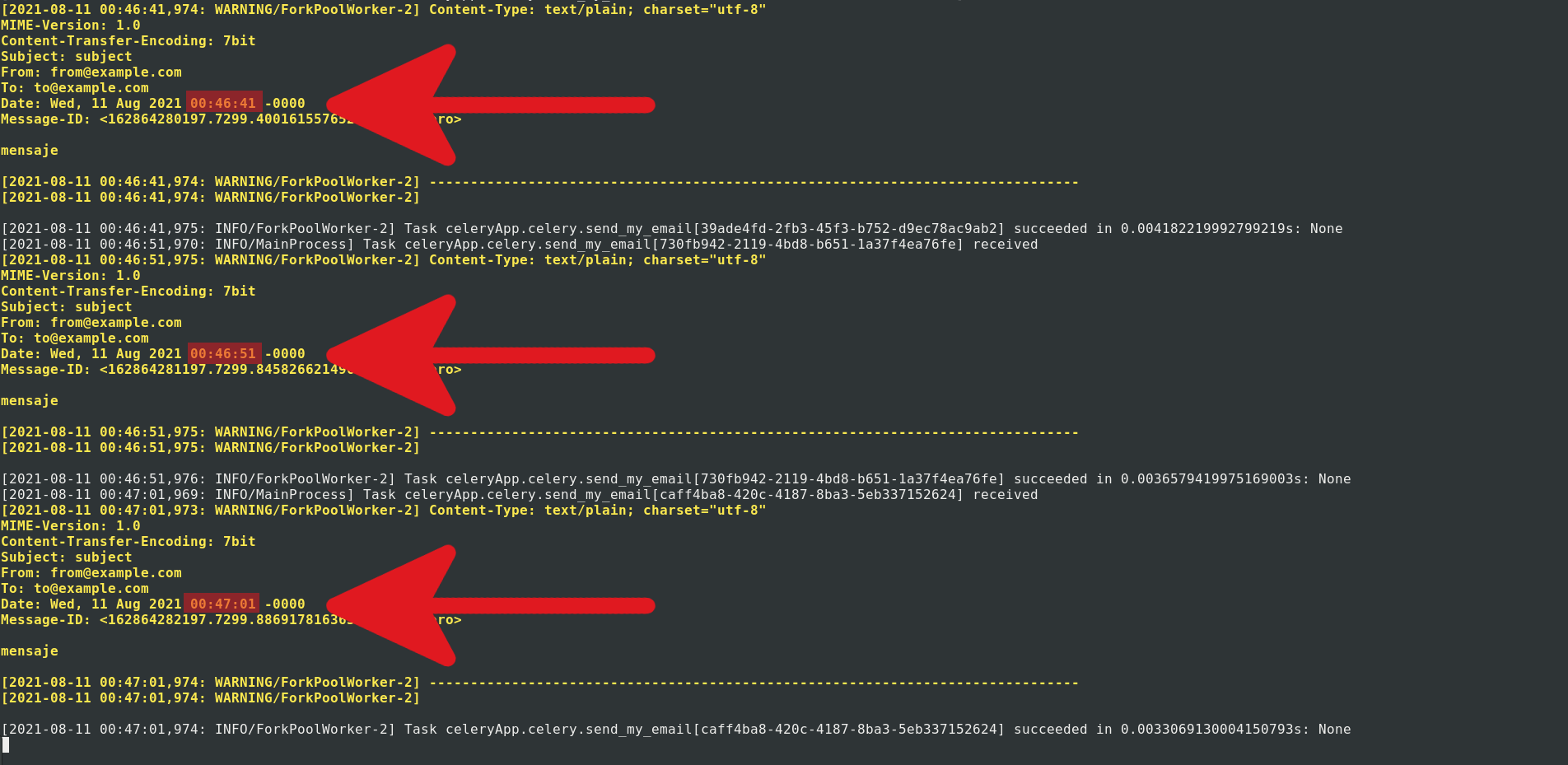Table of contents
Periodic Tasks with Celery and Django
Periodic Tasks with Celery and Django
In addition to creating asynchronous tasks, celery also allows you to create periodic tasks, which are executed from time to time. This can be quite useful to give maintenance to the database from time to time, to send marketing or shopping cart recovery emails, perhaps even to empty the contents of some temporary cache in the database or any repetitive task where execution time is an important factor, that is, to improve the performance of a django application.
Installation and configuration of Celery in Django
The first step is to install Celery:
pip install "celery==5.1.2"
As with asynchronous tasks, we also need rabbitmq or another broker.
sudo apt install rabbitmq-server
Next, at the same level as our configuration file, we will create a file called celery.py, where we will create a celery app and pass the django configuration to it.
# celeryApp/celery.py
import os
from celery import Celery
os.environ.setdefault('DJANGO_SETTINGS_MODULE', 'celeryApp.settings')
app = Celery('celeryApp')
app.config_from_object('django.conf:settings', namespace='CELERY')
app.autodiscover_tasks()
If you have doubts about what each line means or what rabbitmq is for, please visit my post about celery and django.
We also import celery into our init_.py_ file in our django project.
# celeryApp/__init__.py
from .celery import app as celery_app
__all__ = ('celery_app',)
Sounds pretty obvious, but still I remind you; your django application must be running for celery to work.
Periodic sending of tasks with crontab
For this example we are going to send emails periodically. To achieve this, we are going to add our periodic tasks in the file we just created
First we are going to define the function that we want to execute, in this case it will only send an email, using the django function and taking the data of its arguments.
# celeryApp/celery.py
from django.core.mail import send_mail
# ...
@app.task
def send_my_email(subject, message, fromEmail, recipients):
send_mail(
subject,
message,
fromEmail,
recipients,
fail_silently=False,
)
Now let’s set up the celery configuration.
# celeryApp/celery.py
from django.core.mail import send_mail
# ...
@app.on_after_configure.connect
def setup_periodic_tasks(sender, **kwargs):
sender.add_periodic_task(10.0, send_my_email.s('subject', 'message', '[email protected]', ['[email protected]']), name='Envia email cada 10 segundos')
@app.task
def send_my_email(subject, message, fromEmail, recipients):
send_mail(
subject,
message,
fromEmail,
recipients,
fail_silently=False,
)
The decorator @app.on_after_configure tells celery that these functions will be programmed once the configuration is complete.
Our function is going to receive a messenger (sender) as a parameter, we will call its add_periodic_task() method to tell it how often we want our task to be executed and then we will call the s() method of the function we define.
add_periodic_task() receives as first argument the interval in seconds that we want to elapse between each task and the second is our function executing the s() method with its arguments.
We define our function and decorate it with @app.task.
For our periodic scheduling to work, celery needs to be running beat.
beat in celery
What is Beat? Beat is one of your services that takes care of scheduled tasks. Beat is in charge of reading and sending the scheduled tasks to the celery workers that will execute them.
celery -A celeryApp beat -l info
Celery Beat Schematic
Since beat needs to transmit its tasks to a worker, it will be necessary to create one.
celery -A celeryApp worker -l info
Now celery will make sure that an email is sent every 10 seconds (pure spam, I know).
Once the celery services are running we will see how our function starts executing every 10 seconds.
Celery tasks within 10 seconds of each other
Tasks scheduled with crontab
What if instead of specifying an interval to execute the tasks we want them to be executed on a specific date, for example: every Sunday at 1:30 am.
Instead of calculating the seconds we can create a more friendly format with the crontab utility provided by celery.
Yes, you are correct, crontab shares the format with the crontab file used by the GNU/Linux cron daemon , which I already talked about in a post.
Crontab will ensure that the execution format is every Monday at 7:30 a.m.
# celeryApp/celery.py
from celery.schedules import crontab
# ...
@app.on_after_configure.connect
def setup_periodic_tasks(sender, **kwargs):
# ...
sender.add_periodic_task(
crontab(hour=7, minute=30, day_of_week=1),
send_my_email.s('subject', 'message', '[email protected]', ['[email protected]']),
)
# ...
You can see more details directly in the Celery documentation








